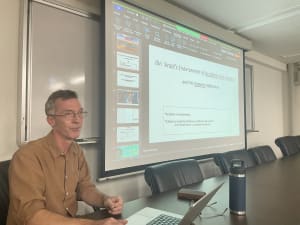Report
Mr. Jason Browning has been affiliated with the Institute for Advanced Studies on Asia as a Visiting Researcher since September 2024. He is currently working on his doctoral dissertation, which he plans to submit to the Program of Central Eurasian Studies at Indiana University. His research investigates the influence of Buddhist philosophy on Islamic thought within the domain of atomism.
In this seminar, Mr. Browning discussed the later reception of atomistic theory in the Islamic world, focusing on the towering figure of Ibn al-ʿArabī. The presentation was lucid and ambitious in scope, though its broad scale naturally limited the opportunity to delve into the finer points of textual evidence and argumentation—perhaps intentionally, to suit the audience's composition. As a result, the Q&A session featured several questions probing the evidentiary basis for key moments within the larger narrative he presented.
The event concluded with a shared sense of anticipation that Mr. Browning will see this promising line of research through to completion—and with the hope that the sentiment expressed by some in the audience, “a major achievement, if proven correct,” will soon be confidently restated as simply, “a major achievement!”
The seminar was attended by 9 in-person and 11 online participants.
Event Details
Lecture Title:
Ibn ‘Arabī’s Endorsement of Accidents-Only Atomism and His Esoteric Addendum
Speaker:
Mr. Jason Browning (Indiana University-Bloomington / IASA) Profile: https://ceus.indiana.edu/people/graduate/doctoral/browning-jason.html
Date:
Thursday, 26 June 2025, 18:00–19:30 (JST)
Venue:
Room 304, Institute for Advanced Studies on Asia (Tōyō Bunka Kenkyūjo), University of Tokyo and online via Zoom
Abstract:
Ibn ‘Arabī is often referred to as a “mystic-philosopher,” but such attributions typically overlook the fact that he was quite rigorous and astute in his critiques of Islamic philosophical and theological traditions. In this talk I will demonstrate that Ibn ‘Arabī’s criticism of Ash‘arī atomism amounts to an endorsement of the competing atomism of Ḍirār ibn ‘Amr (ca. 728-815 CE) and those influenced by him. After drawing out the idiosyncracies of Ibn ‘Arabī’s scholarly methods and writing style, it will become evident that he undoubtably knew of substance-less, accidents-only atomic theories and chose to fashion them into his own innovative, esoteric atomic theory.

